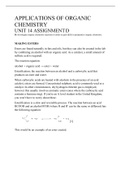Summary
Summary Unit 14 D - Making designer chemicals
- Institution
- PEARSON (PEARSON)
This is the assignment I handed in. My final overall grade was D*D*D*. This will help show you what you need to include in your work and hopefully give you an outline of how to structure your assignment.
[Show more]



